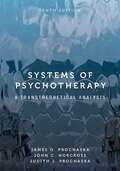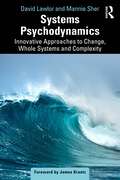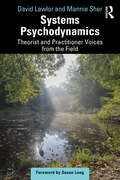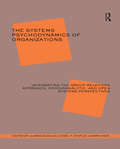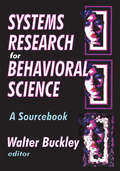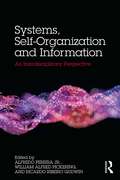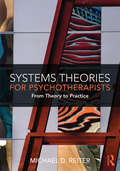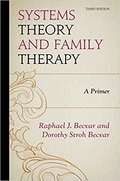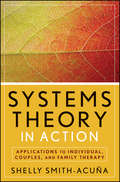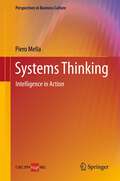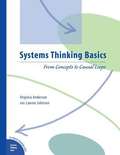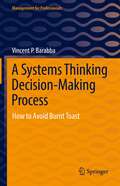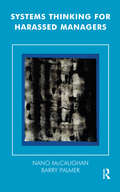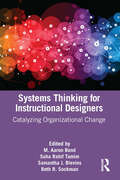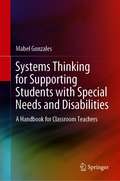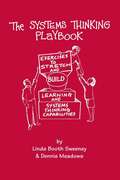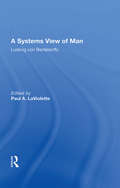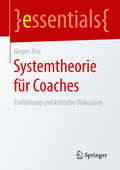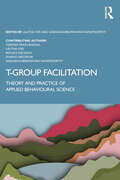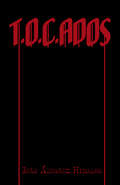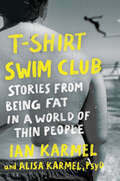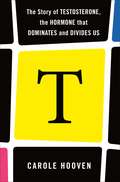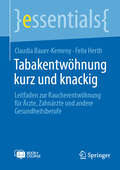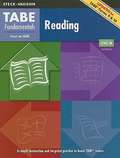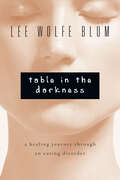- Table View
- List View
Systems of Psychotherapy: A Transtheoretical Analysis
by James O. Prochaska John C. Norcross Judith J. ProchaskaComprehensive, systematic, and balanced, Systems of Psychotherapy uses a wealth of clinical cases to help readers understand the major psychotherapies, including psychodynamic, existential, experiential, interpersonal, exposure, behavioral, cognitive, third wave, systemic, multicultural, and integrative. The tenth edition of this landmark text thoroughly analyzes 15 leading systems of psychotherapy and briefly surveys another 32, providing students and practitioners with a broad overview of the discipline. The book explores each system's theory of personality, theory of psychopathology, and resulting therapeutic process and relationship. Through these explorations, the authors clearly demonstrate how psychotherapy systems agree on the processes producing change while diverging on the elements in need of change. Additionally, the authors present the central limitations, outcome research, and future directions of each system of psychotherapy. This tenth edition features a reconfigured chapter on positive psychological treatments, expanded coverage of the Unified Protocol and transdiagnostic personalizing, new self-reflection exercises, additional examples of child and adolescent therapy, and more than 500 new references, recommended readings, and web resources.
Systems Psychodynamics: Innovative Approaches to Change, Whole Systems and Complexity
by David Lawlor Mannie SherIn the second of this three-volume series, the authors expand on the theory and practice of systems psychodynamics – which integrates psychoanalytic thinking, open systems theory and complexity theory – in its applications to consultancy work in organisations and wider social contexts. Multidisciplinary and multitheoretical in nature, the systems psychodynamics paradigm develops from the understanding that no single theory or approach explains the complex nature of organisational systems. Replete with explanations of key theories, practical guidance and exercises, this book demonstrates how systems psychodynamics can be used by consultants to plan and put into action organisational changes in four main areas: change planning and management; action research and evaluation; leadership and whole systems; and professional development and next steps. In light of systems psychodynamics, rather than functioning as a leader of change processes, the role of an organisational development consultant is one of providing containment, understanding and facilitation for others to take up their leadership roles responsibly in their change processes. With a focus on practical application in real situations, this book will be invaluable for psychoanalysts, managers, policymakers, consultants and researchers in a wide range of professional and clinical settings.
Systems Psychodynamics: Theorist and Practitioner Voices from the Field
by David Lawlor Mannie SherThrough a series of in-depth interviews with Tavistock thinkers across three generations, this volume illustrates the practice and application of the systems psychodynamics paradigm to organisational development consultancy, research and training. Across 28 stimulating interviews with a group of international consultants, interviewees present a critical appraisal of the systems psychodynamics paradigm and its application to present-day social and organisational difficulties. By using a narrative interpretive method, the interviewers attend to the historical, psychosocial and biographical dynamics of the interviewees’ approaches and methods of work, and address several areas of organisational consultancy. These include organisational design, the division of labour, levels of authority and reporting relationships; the nature of work tasks, processes and activities; primary tasks and the inevitable unconscious dynamics within systems and individuals. The multi-disciplinary approaches of the interviewees will interest managers, policymakers, consultant practitioners and researchers to understand the variety of applications of systems psychodynamics methodologies.
The Systems Psychodynamics of Organizations: Integrating the Group Relations Approach, Psychoanalytic, and Open Systems Perspectives
by Laurence J. GouldThis authoritative source book on the learning and creative application of the systems psychodynamic perspective defines the field, presenting the key concepts, models, and social methodologies that derive from it, together with their theoretical and conceptual underpinnings in psychoanalysis, group relations and open systems theory.
Systems Research for Behavioral Science: A Sourcebook
by Walter BuckleySystems Research for Behavioral Science will be of interest to those in any discipline concerned with developments in science. It is addressed principally to the student of human behavior as that study is approached from the social side.Previously, the study of human behavior was the general area of science that had been slowest to respond to the exciting challenge of the modern systems outlook. Yet it is behavioral science that stands to gain the most from insights into the workings of more complex systems.The editor presents not only a fair selection of systems research in behavioral science, but also provides an extensive selection of important statements of general principles, including several already considered classics. Hence, this sourcebook may function in part as a principles text, exposing the initiate to original pioneering statements as well as later work inspired by them, and alerting the sizeable number of underexposed scholars who are over-familiar with the few terms such as feedback, boundary, input, and output, that there are much greater depths to plumb than meet the eye in semi-popular accounts of cybernetics.This volume is an overview of thinking that reflects a trend toward the system point of view. Some of the chapters are philosophical: they discuss the significance of the trend as a development in the contemporary philosophy of science. Some are inevitably detailed and technical. Still other chapters discuss the relevance of concepts that are central in the system approach, to particular fields of research. The picture that emerges is far from that of a unified theory. It is an open question whether much progress can be made by attempts to construct a "unified theory of systems" on some rigorous axiomatic base.
Systems, Self-Organisation and Information: An Interdisciplinary Perspective
by Pereira Junior Alfredo William A Pickering Ricardo Ribeiro GudwinComplex system studies are a growing area of central importance to a wide range of disciplines, ranging from physics to politics and beyond. Adopting this interdisciplinary approach, Systems, Self-Organisation and Information presents and discusses a range of ground-breaking research in complex systems theory. Building upon foundational concepts, the volume introduces a theory of Self-Organization, providing definitions of concepts including system, structure, organization, functionality, and boundary. Biophysical and cognitive approaches to Self-Organization are also covered, discussing the complex dynamics of living beings and the brain, and self-organized adaptation and learning in computational systems. The convergence of Peircean philosophy with the study of Self-Organization also provides an original pathway of research, which contributes to a dialogue between pragmatism, semeiotics, complexity theory, and self-organizing systems. As one of the few interdisciplinary works on systems theory, relating Self-Organization and Information Theory, Systems, Self-Organisation and Information is an invaluable resource for researchers and postgraduate students interested in complex systems theory from related disciplines including philosophy, physics, and engineering.
Systems Theories for Psychotherapists: From Theory to Practice
by Michael D. Reiter<p><i>Systems Theories for Psychotherapists</i> explores three key theories that underpin many of the models of psychotherapy: general systems theory, natural systems theory, and language systems theory. The book presents the aesthetics (how to see and understand what is happening) and the pragmatics (what to do in the therapy room) behind each theory. It also explores how therapists can successfully conceptualize the problems that clients bring to therapy, offering a range of contemporary examples to show how each theory can be applied to practice. <p>Starting with an introduction to systems theories, the book then delves into cybernetics, interactional systems, natural systems, constructivist theory, and social construction theory. Each chapter uses a distinctive case example to help clinicians to better understand and apply the theories to their own therapeutic setting. Woven throughout the book are three helpful learning tools: "Applying Your Knowledge," "Key Figure," and "Questions for Reflection," providing the reader with the opportunity to critically engage with each concept, consider how their own world view and preconceptions can inform their work with clients, and challenging them to apply prominent systems theories to their own practice. <p><i>Systems Theories for Psychotherapists</i> is a clear and valuable text for undergraduate and graduate students in mental health programs, including counseling, marriage and family therapy, social work and clinical psychology, as well as for all practicing clinicians.</p>
Systems Theory and Family Therapy: A Primer
by Dorothy Stroh Becvar Raphael J. BecvarThis book provides an overview of the basic concepts of a systems theoretical perspective using families and family therapy as examples and illustrations of their application in professional practice. This meta-perspective focuses on viewing problems in context. <P><P>The difference between first-order and second-order cybernetics is explicated. Readers then are invited to see themselves as parts of the systems with which they are working consistent with a second-order cybernetics perspective. Along the way a difference between modernism and post-modernism as well as constructionism and social constructionism also are described. In addition, theories of individual and family development are presented with implications for their use in family therapy. The book concludes with more than 100 examples of how the meta-perspective of systems theory can be used in work with families.
Systems Theory in Action
by Shelly Smith-Acuña"Smith-Acuña illuminates the structural hierarchy, roles, and boundaries that give a system structure. The relationship between parts and wholes is both simple and profound, and particularly important in looking at systems structure. These morsels of wisdom are good examples of Smith-Acuña's grace as a systems theory tour guide: one moment she's digging deeper into the nuances among the theories, the next moment she's simplifying without dumbing down, but in a manner that is enormously liberating. We enjoy the fun, full, and informed journey with her." -Frank S. Pittman III, MDA practical presentation of systems theory as a fundamental model for clinical practiceValuable for seasoned mental health professionals as well as those in training, Systems Theory in Action presents systems theory-the unifying principles surrounding the organization and functioning of systems-as it applies to individual, couples, and family therapy.This innovative book explores systems theory as an effective model for general mental health practice. It examines the role systems theory can play, specifically in understanding clients' presenting problems in context, within the various systems and subsystems in which the problems are embedded.Filled with realistic clinical stories illustrating relevant concepts that tie theory to technique, Systems Theory in Action takes an in-depth look at: Systems theory as a solid guide through the dynamic process of psychotherapy The multilayered value of observing human interactions through a systems view Systemic thinking, its core components, and how it serves to reveal a "big picture" view of clients and their presenting problemsSystems Theory in Action is a unique contribution to the field, translating the technical terminology of general systems thinking into common, everyday language.
Systems Thinking: Intelligence in Action
by Piero MellaThe core belief underlying this book is that the most useful and effective models to strengthen our intelligence are system ones, developed following the logic of Systems Thinking. Such models can explore complexity, dynamics, and change, and it is the author's view that intelligence depends on the ability to construct models of this nature. The book is designed to allow the reader not only to acquire simple information on Systems Thinking but above all to gradually learn the logic and techniques that make this way of thinking an instrument for the improvement of intelligence. In order to aid the learning and practice of the Systems Thinking discipline, the author has abandoned a rigid formal language for a more discursive style. He writes in the first person, with an ample number of citations and critical analyses, and without ever giving in to the temptation to use formal mathematics.
Systems Thinking Basics: From Concepts to Causal Loops
by Virginia Anderson Lauren Johnson<p>Systems Thinking Basics is a self-study, skill-building resource designed to introduce you to the power of systems thinking tools. With an emphasis on behavior over time graphs and causal loop diagrams, this workbook guides you step by step through: Recognizing systems and understanding the importance of systems thinking; Interpreting and creating behavior over time graphs and causal loop diagrams; Applying and practicing systems thinking day-to-day. <p>Each of the book's six main sections contains a wealth of examples from the business world, as well as learning activities that reinforce concepts and provide you with the opportunity and space to practice. An array of appendices offers: Extra practice activities; A summary of key points and suggested responses to the learning activities; A table showing the "palette" of systems thinking tools available; A glossary of systems thinking terms; A list of additional resources; A summary of the systems archetypes. <p>The many diagrams within the book clarify concepts and visually reinforce key principles. Systems Thinking Basics is ideal for aspiring systems thinkers eager to try their hand at using these powerful tools</p>
A Systems Thinking Decision-Making Process: How to Avoid Burnt Toast (Management for Professionals)
by Vincent P. BarabbaThis book illustrates how to access the right information for making the best decisions during turbulent times. It is written from an experienced-based perspective that is beneficial for those looking for the development and improvement of the decision-making process. The approach is centered on the author’s experience in developing and implementing effective and efficient approaches to decision-making in business and government. Based on those experiences, this book provides insights into how to improve the decision making process of your organization, whether it be large or small. For decision makers and those providing market information for making decisions, this book provide guidelines for a framework which includes systems thinking. For those interested in change management and corporate governance, the book presents examples where it was done well and some examples where it was not and the ensuring consequences. Praise for Systems Thinking Decision-Making Process… "This is an absolutely incredible book by a distinguished practitioner. The range of knowledge and experience that Vince Barabba has had is astounding. I urge everyone who is interested in complex, messy problems to read this amazing book.” --Ian I. Mitroff “…Vince has masterfully blended the art of organizational respect with the science of data inquiry to drive change and realize strategic vision. A master storyteller, he does not just teach, his book brings his learnings to life in a meaningful way that if carefully listened to, can change the course of a career.” -- Paul D'Alessandro Principal, Health Industries, PwC US “In his latest book, Vince Barabba integrates his vast knowledge from 50 years of dedicated work in both the public and private sectors in order to provide leaders with an actionable framework for radically improving how their organizations collect and use information to make the best decisions for all the wicked messes that now appear in our global village… This book can save your company from living in the dark with false assumptions about all your key stakeholders.” -- Ralph H. Kilmann, Ph.D. CEO, Kilmann Diagnostics Co-Author, The Thomas-Kilmann Conflict Mode Instrument (TKI) "Absorbing just a few of the many smart ideas in this book will make you a better leader and decision maker. Thinking systemically about how the hard-earned lessons from Vince Barabba’s brilliant career apply to your enterprise could make you a great one." — Chunka Mui Co-Author, A Brief History of a Perfect Future and Billion Dollar Lessons “…if you are interested in ‘thinking in systems,’ this book is for you. The ‘On Star’ story demonstrates to you how the initial product-centered thinking was proselytized to ‘thinking in systems’." -- John Pourdehnad Visiting Professor, IESE Business School and Faulty of Systems Leadership, Thomas Jefferson University “In writing Systems Thinking Decision-Making Process: How to Avoid Burnt Toast, Vince Barabba is addressing the limits of knowledge management systems which enable ‘organizations as usual’ to share best practices on how to scrape toast faster and cheaper… The examples shared by Vince, from his first-hand experiences in corporate America or his services as a marketing consultant, contribute invaluable clarity to his goal of providing a “sketch of an Inquiry Center Learning and Support System” for those with the ambition to lead efforts to work smarter, not harder, firmly against the grain of ‘organizations as usual’…” -- Bill Bellows, Ph.D., President, InThinking Services Adjunct Professor, California State University, Northridge and Southern Utah University Advisory Council Member and Former Deputy Director, The W. Edwards Deming Institute® “In his ‘last book’, Vince weaves the experiences and learning of a lifetime into whole cloth of insight
Systems Thinking for Harassed Managers (The Systemic Thinking and Practice Series)
by Nano McCaughan Barry PalmerThis book describes the processes that shape organisational life and shows how managers can work together to help one another to work out their problems and develop their skills. The authors draw on their experiences of working with managers and in the group relations field.
Systems Thinking for Instructional Designers: Catalyzing Organizational Change
by M. Aaron BondSystems Thinking for Instructional Designers offers real-world cases that highlight how designers foster continuous improvement and manage change efforts across organizational contexts. Using a systems thinking approach, each case describes a holistic process that examines how a set of interdependent elements can be analyzed and coordinated to influence change. Instructional designers, faculty, program directors, digital learning leaders, and other development specialists will learn how systems thinking can solve authentic, real-world challenges. The book’s rich narratives cover both successes and failures of meaningful growth, paradigm shifts, and large-scale problem-solving in a variety of settings, including education and industry.
Systems Thinking for Supporting Students with Special Needs and Disabilities: A Handbook for Classroom Teachers
by Mabel GonzalesThis book provides school leaders and teachers with research-based theories and models on systems thinking and on inclusive education. It offers the ‘why’, ‘what’ and ‘how’ of inclusive teaching and learning with specific references to a range of special needs. It discusses topics such as a sustainable approach to inclusion, differentiation of learning programs and activities, and a range of assessment approaches to support teaching and learning. The book also presents the social aspects of inclusion and encourages teachers and school leaders to focus not only on the academic aspects of education but the social and emotional growth of the student. It highlights the value of parent input and promotes the forming of parent partnership to enhance student learning and wellbeing. Part One of the book gives practical suggestions on how school leaders can apply systems thinking to mobilise the school and school community to contribute to the ideals of Education For All. Part Two discusses a range of disabilities with each chapter covering the medical definitions and characteristics of the condition, the challenges faced by the student, their parents and teachers, and presents evidence-based strategies and classroom management tips to help teachers with their everyday classroom needs. The book helps to heighten school leaders’ awareness on how to use systems thinking to mobilise the school community to action. It strengthens teachers' confidence and builds their capacity in providing all students with access to flexible learning choices to help them achieve educational goals and develop a sense of belonging.
The Systems Thinking Playbook: Exercises To Stretch And Build Learning And Systems Thinking Capabilities
by Linda Booth Sweeney Dennis MeadowsThis book has become a favorite of K-12 teachers, university faculty, and corporate consultants. It provides short gaming exercises that illustrate the subtleties of systems thinking. The companion DVD shows the authors introducing and running each of the thirty games. The thirty games are classified by these areas of learning: Systems Thinking, Mental Models, Team Learning, Shared Vision, and Personal Mastery. Each description clearly explains when, how, and why the game is useful. There are explicit instructions for debriefing each exercise as well as a list of all required materials. A summary matrix has been added for a quick glance at all thirty games. When you are in a hurry to find just the right initiative for some part of your course, the matrix will help you find it. Linda Booth Sweeney and Dennis Meadows both have many years of experience in teaching complex concepts. This book reflects their insights. Every game works well and provokes a deep variety of new insights about paradigms, system boundaries, causal-loop diagrams, reference modes, and leverage points. Each of the thirty exercises here was tested and refined many times until it became a reliable source of learning. Some of the games are adapted from classics of the outdoor education field. Others are completely new. But all of them complement readings and lectures to help participants understand intuitively the principles of systems thinking.
A Systems View Of Man: Collected Essays
by Ludwig von BertalanffyWhat does it mean to be human? What distinguishes man from other animals? “Man’s creation of the universe of symbols,†replies Ludwig von Bertalanffy. “Man lives in a world not of things, but of symbols.†Dr. von Bertalanffy explores the historical development of symbolic language, examines the nature of human values, and shows how a current breakdown of symbolic universes contributes to the feeling of meaninglessness so prevalent in modern society. He notes that a major portion of mankind’s aggressive acts are not biologically induced but arise within symbolic frameworks.
Systemtheorie für Coaches: Einführung und kritische Diskussion (essentials)
by Jürgen KrizDas essential bietet eine prägnante Übersicht über zentrale Konzepte und Begrifflichkeiten, die häufig im Kontext systemischen Coachings vorkommen. Den Ausführungen liegt ein Ansatz zugrunde, der auf dem Boden interdisziplinärer Systemtheorie (,,Synergetik") als ,,Personzentrierte Systemtheorie" bekannt ist. Die dort entwickelten Konzepte und Prinzipien ermöglichen ein systemtheoretisch begründetes und konsistentes Verständnis bezüglich der Entstehung, Stabilität und Veränderung von Problemstrukturen. Damit lassen sich zentrale Aspekte und Fragen, die im Bereich des Coachings auftreten, auf systemtheoretische Weise betrachten, was es ermöglicht, das Handlungspotenzial im systemischen Coaching in konsistenter Weise weiterzuentwickeln und zu vertiefen.
T-Group Facilitation: Theory and Practice of Applied Behavioural Science
by Tejinder Singh Bhogal Lalitha Iyer Renuka Raj Singh Sharad Sakorkar Sankarasubramanyan RamamoorthyThis book offers the core conceptual base for the practice of T-Group facilitation. Drawing from the fields of psychology, social psychology, sociology, diversity studies and Indian philosophical thoughts, this book is a great resource for enhancing the practice of T-Group facilitation, for both budding and established facilitators. It covers a wide range of theories on human development, self-awareness, interpersonal interactions, groups and change. Individual and group identities, diversity, inclusion and social hierarchies are explored in detail here. The authors offer a model of T-Group facilitation based on 50 years of experience within the Indian Society for Applied Behavioural Science (ISABS). This model is useful not only for fellow practitioners of T-Groups but also for anyone engaged in facilitating groups, organizations and communities globally. This book helps one to reflect, develop and sharpen one’s competencies, values and ethics in this field. The chapters are embedded with activities, quizzes, case studies and exercises to facilitate a deeper understanding of the various elements used in the book. This book will be of interest to students, teachers and practitioners of psychology, social psychology, management studies and organizational development. It will also be useful for T-Group facilitators, facilitators of experiential groups and related fields.
T.O.C. ADOS
by Iván Álvarez HidalgoMe llamo Iván, tengo un trastorno obsesivo compulsivo (un trastorno muy peculiar) y escribo mi autobiografía, cómo sobrellevar la enfermedad, tanto interiormente como exteriormente, ya que he estudiado psicología y hablo sobre la psicología del trastorno obsesivo compulsivo y general, psicosocial, filosofía, aforismos, sentencias morales, proverbios orientales, valores y sobre el tema social del siglo XXI.
T-Shirt Swim Club: Stories from Being Fat in a World of Thin People
by Ian Karmel Alisa KarmelComedian Ian Karmel, with help from his sister, Dr. Alisa Karmel, opens up about the daily humiliations of being fat and why it&’s so hard to talk about something so visible.&“As charming and funny as it is poignant and thoughtful.&”—Roxane Gay, author of Hunger: A Memoir of (My) BodyIan Karmel has weighed eight pounds and he has weighed 420 pounds and right now he&’s almost exactly in between the two, but this book is not a weight-loss book. It&’s about being a fat person in a skinny world. It&’s about gym class and football practice, about chicken wings and juice cleanses, about airplane seats and roller coasters, about fat jokes and Jabba the Hutt, about crying in the Big and Tall section and the joys of being a sneakerhead, about prediabetes and gout, and about realizing that you actually don&’t want to eat yourself to death and hoping it&’s not too late.This book also includes a &“What Now?&” section from Ian&’s sister, Alisa, who herself cycled through so many fad diets that she eventually pursued a master&’s in nutrition and a doctorate in psychology with the goal of changing the contemporary narrative around fatness.Ian and Alisa Karmel grew up fat. As kids, they never talked about it. They were too busy fighting over the last SnackWell&’s Devil&’s Food cookie. Now, decades later, having both turned into fat adults who eventually figured out how to get their health under control, they are finally ready to unpack the impact that their weight has had on them.For them, the T-Shirt Swim Club is meant to be a place of support for anyone who struggles with weight issues. A place of care and candor, free of shame. A place to not deny or avoid the emotions you feel, the experiences you go through, the embarrassment, the anger, the resentment. T-Shirt Swim Club is about being a fat person and how the world treats fat people—but also an acknowledgment that maybe it doesn&’t always have to feel quite so lonely.
T: The Story of Testosterone, the Hormone that Dominates and Divides Us
by Carole HoovenThrough riveting personal stories and the latest research, Harvard evolutionary biologist Carole Hooven shows how testosterone drives the behavior of the sexes apart and how understanding the science behind this hormone is empowering for all.Since antiquity—from the eunuchs in the royal courts of ancient China to the booming market for “elixirs of youth” in nineteenth-century Europe—humans have understood that typically masculine behavior depends on testicles, the main source of testosterone in males. Which sex has the highest rates of physical violence, hunger for status, and desire for a high number of sex partners? Just follow the testosterone.Although we humans can study and reflect on our own behavior, we are also animals, the products of millions of years of evolution. Fascinating research on creatures from chimpanzees to spiny lizards shows how high testosterone helps males out-reproduce their competitors. And men are no exception.While most people agree that sex differences in human behavior exist, they disagree about the reasons. But the science is clear: testosterone is a potent force in human society, driving the bodies and behavior of the sexes apart. But, as Hooven shows in T, it does so in concert with genes and culture to produce a vast variety of male and female behavior. And, crucially, the fact that many sex differences are grounded in biology provides no support for restrictive gender norms or patriarchal values. In understanding testosterone, we better understand ourselves and one another—and how we might build a fairer, safer society.
Tabakentwöhnung kurz und knackig: Leitfaden zur Raucherentwöhnung für Ärzte, Zahnärzte und andere Gesundheitsberufe (essentials)
by Claudia Bauer-Kemeny Felix HerthDieses Essential plus course möchte allen im Gesundheitswesen tätigen Personen aufzeigen, wie Sie schnell und einfach, aber dennoch effektiv Tabakentwöhnung im Klinik- oder Praxisalltag durchführen können. In Verbindung mit dem dazugehörigen Online-Kurs lernen Sie die Methoden der Kurzintervention kennen, werden über die zur Tabakentwöhnung zugelassenen Medikamente informiert und erfahren, wo und wie entwöhnungswillige Rauchende weitere Unterstützungsangebote erhalten, damit ein Rauchstopp auch wirklich gelingen kann. Den kostenlosen Zugang zum Online-Kurs finden Sie direkt im Buch.
TABE Fundamentals: Reading, Level M (2nd edition)
by Steck-VaughnTABE stands for the Tests of Adult Basic Education. These paper-and-pencil tests, published by McGraw-Hill, measure your progress on basic skills. There are five tests in all: Reading, Mathematics Computation, Applied Mathematics, Language, and Spelling.
Table in the Darkness: A Healing Journey Through an Eating Disorder
by Lee Wolfe Blum2014 Readers' Choice Awards Honorable Mentionnot
